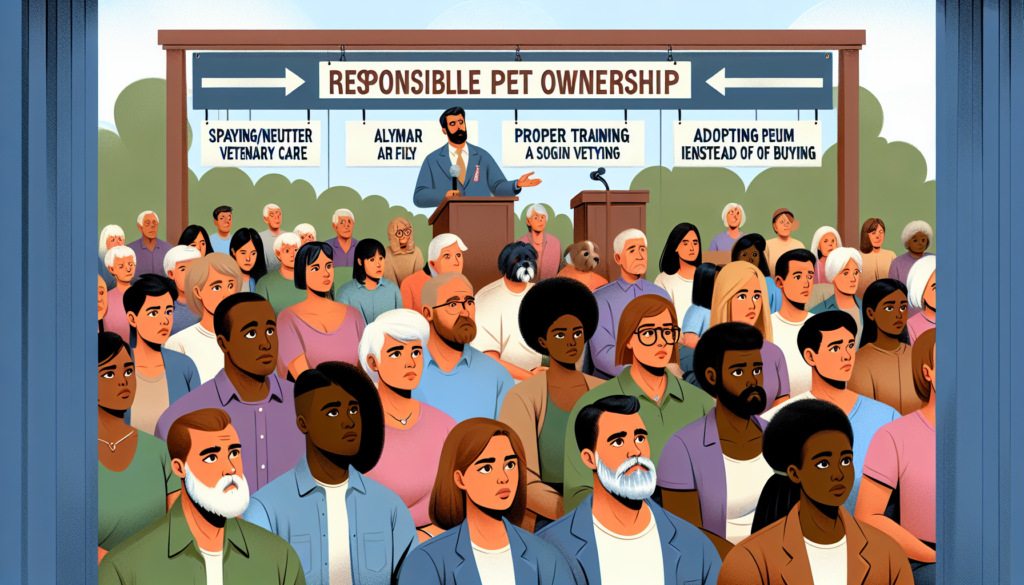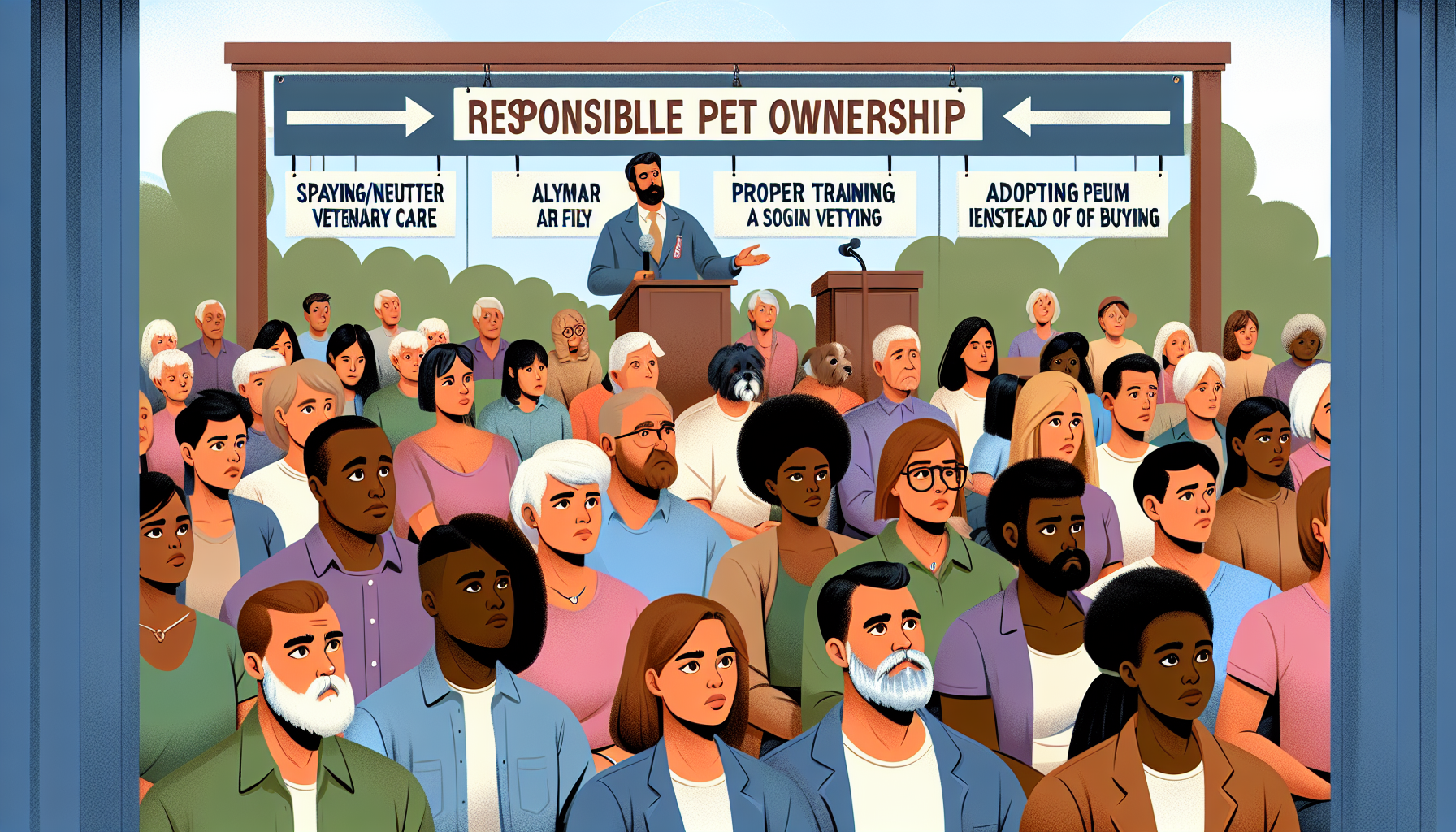Are you a passionate pet owner who believes in responsible pet ownership? If so, you’ll understand the importance of educating the public on the topic. In this article, we will explore effective strategies to spread awareness and promote responsible pet ownership in your community. From organizing education campaigns to utilizing social media platforms, we will provide you with practical tips on how to make a positive impact and ensure the well-being of pets everywhere. So, let’s get started on this journey to create a more educated and compassionate pet-loving society!
Campaigns and Events
Organizing awareness campaigns
One of the most effective ways to educate the public about responsible pet ownership is through organizing awareness campaigns. These campaigns serve as a platform to raise awareness about the importance of responsible pet ownership and to provide valuable information on topics such as proper care, training, and the benefits of spaying and neutering pets. By partnering with local businesses, community organizations, and animal welfare groups, these campaigns can reach a wider audience and have a greater impact.
Hosting educational events
In addition to awareness campaigns, hosting educational events is another powerful tool to educate the public about responsible pet ownership. These events can include workshops, seminars, and presentations led by experts in the field of animal care and training. By providing valuable information and practical tips, these events empower pet owners to better understand their responsibilities and make informed decisions regarding the health and well-being of their pets.
Collaborating with local organizations
Collaborating with local organizations is essential in creating a comprehensive approach to educating the public about responsible pet ownership. By joining forces with animal rescues, shelters, and other community groups, you can pool resources and expertise to reach a larger audience. This collaboration can involve joint initiatives, sharing resources, and co-hosting events to maximize the impact of your efforts.
Utilizing social media platforms
In today’s digital age, social media platforms have become a powerful tool for spreading information and raising awareness. By utilizing platforms such as Facebook, Instagram, and Twitter, you can reach a wide audience and engage with pet owners on a daily basis. Share useful tips, answer questions, and post educational content to promote responsible pet ownership. Encourage followers to share information with their networks, amplifying the message and creating a community dedicated to responsible pet ownership.
Creating Educational Materials
Developing brochures and flyers
Developing brochures and flyers is an effective way to disseminate information on responsible pet ownership. Create visually appealing materials that outline important topics such as pet care, training, and the benefits of spaying and neutering. Distribute these materials at local pet stores, veterinary clinics, community centers, and during events to ensure they reach a broad audience.
Producing informative videos
In the age of digital media, videos are a highly engaging and shareable format for educating the public about responsible pet ownership. Produce informative videos that cover a range of topics, including basic care, training techniques, and the importance of vaccination and regular veterinary check-ups. Share these videos on social media platforms, your organization’s website, and partner websites to reach a wide audience and provide valuable educational content.
Designing infographics
Infographics are a visually appealing and concise way to present information. Design infographics that highlight important statistics, facts, and tips related to responsible pet ownership. These can cover topics such as pet health, nutrition, and behavioral training. Share these infographics on social media platforms and include them in your educational materials to capture the attention of the public and convey key information in an easily digestible format.
Publishing articles and blog posts
Publishing articles and blog posts is an effective way to educate the public about responsible pet ownership while establishing yourself as a trusted source of information. Write informative articles and blog posts that cover a variety of topics, including pet health, behavior, and training. Seek opportunities to contribute to local newspapers, magazines, and online platforms to reach a broader audience. Additionally, maintain an active blog on your organization’s website, sharing valuable information and insights with your readers.

Engaging Schools and Communities
Establishing partnerships with schools
Engaging schools is a key strategy for promoting responsible pet ownership. Establish partnerships with local schools and offer educational programs tailored for different grade levels. Conduct presentations in classrooms, organize pet care workshops, and involve students in hands-on activities that teach them about pet care, empathy, and responsible ownership. By targeting schools, you can reach not only the students but also their families and the wider community.
Delivering presentations in classrooms
Delivering presentations in classrooms is an impactful way to directly educate students about responsible pet ownership. Prepare interactive and engaging presentations designed to teach students about proper care, safety, and the responsibilities associated with owning a pet. Encourage discussions and provide resources, such as brochures and informational handouts, for students to take home and share with their families.
Offering workshops for community groups
Engaging with community groups through workshops is an effective strategy to reach a larger audience and promote responsible pet ownership. Collaborate with local community centers, neighborhood associations, and youth organizations to offer workshops on topics such as pet care, training, and the benefits of spaying/neutering. These hands-on workshops can include demonstrations, Q&A sessions, and interactive activities to provide participants with practical knowledge and skills.
Participating in community events
Participating in community events is an excellent opportunity to engage with the public and promote responsible pet ownership. Set up informational booths or stations at local fairs, festivals, and other community events. Distribute educational materials, answer questions, and provide demonstrations or activities that illustrate responsible pet ownership. By actively participating in these events, you can effectively reach a diverse audience and create lasting connections within the community.
Collaborating with Animal Welfare Groups
Partnering with local animal shelters
Collaborating with local animal shelters is a crucial component of educating the public about responsible pet ownership. Partner with shelters to promote adoption initiatives, responsible pet care, and spay/neuter programs. Support their efforts by sharing their adoption events and profiles of adoptable pets on your organization’s social media platforms and website. By working together, you can amplify the message of responsible pet ownership and enhance the welfare of animals in your community.
Supporting spay/neuter programs
One of the most effective ways to reduce pet overpopulation is through spaying and neutering programs. Partner with veterinary clinics and animal welfare organizations to support and promote these programs in your community. Educate pet owners about the benefits of spaying and neutering, such as reducing the risk of certain diseases and behavioral issues. Offer resources and financial assistance to make these procedures more accessible to those in need.
Promoting adoption initiatives
Promoting adoption initiatives is an essential aspect of responsible pet ownership education. Encourage potential pet owners to adopt from shelters by highlighting the benefits of adopting, such as saving a life and supporting responsible breeding practices. Organize adoption events in collaboration with local shelters and rescue groups, providing a platform for people to meet adoptable pets and learn about the responsibilities of pet ownership.
Providing volunteering opportunities
Engage the public in responsible pet ownership by offering volunteering opportunities. Partner with local animal shelters and rescue groups to provide individuals with a chance to contribute to the welfare of animals in need. This can include tasks such as assisting with pet care, socialization, and education programs. By involving the community in hands-on activities, you foster a sense of responsibility and compassion towards animals.

Promoting Responsible Breeding Practices
Educating about the importance of responsible breeding
Educating the public about the importance of responsible breeding practices is crucial in preventing overpopulation and promoting the health and well-being of animals. Raise awareness about the negative consequences of irresponsible breeding, such as genetic disorders and increased strain on animal shelters. Provide information on how to identify responsible breeders who prioritize the health and welfare of their animals.
Encouraging breed-specific organizations to lead by example
Breed-specific organizations play a significant role in promoting responsible pet ownership within their respective communities. Encourage these organizations to lead by example in practicing responsible breeding and ownership. Collaborate with them to develop educational materials, organize events, and provide resources that emphasize the importance of responsible breeding practices. By working together, you can create a broader positive impact on the animal welfare community.
Highlighting the benefits of spaying/neutering
Promote the benefits of spaying and neutering to combat pet overpopulation and improve the overall health of pets. Educate the public about the various advantages of these procedures, such as reducing the risk of certain cancers, preventing unwanted behaviors, and increasing the lifespan of pets. Highlight success stories and testimonials from pet owners who have witnessed the positive impact of spaying/neutering their animals.
Raising awareness about pet overpopulation
Raising awareness about pet overpopulation is essential in encouraging responsible pet ownership. Share statistics and information about the consequences of uncontrolled breeding, such as overcrowded shelters and euthanasia rates. Utilize social media, local media outlets, and community events to spread the message and emphasize the importance of responsible pet ownership in combating this issue.
Offering Training and Behavior Resources
Providing obedience classes
Offering obedience classes is a valuable resource for pet owners to develop proper training techniques and establish a bond with their pets. These classes provide guidance on basic commands, leash manners, and behavioral training. Create a curriculum that addresses common behavior issues and provide hands-on training sessions to help pet owners effectively train their pets.
Hosting behavior workshops
Hosting behavior workshops can address more specific behavior issues and challenges that pet owners may face. These workshops can cover topics such as separation anxiety, aggression, and fear-based behaviors. Invite professionals, such as trainers and behaviorists, to lead these workshops and provide attendees with practical tips and strategies to address behavioral issues in a positive and effective manner.
Sharing training guides and manuals
Make training guides and manuals readily available to the public as a valuable resource for responsible pet ownership. Develop comprehensive materials that cover various training techniques, behavior modification strategies, and tips for addressing common challenges. Distribute these resources through your organization’s website, social media platforms, and at community events to ensure easy access to information for pet owners.
Offering online resources and forums
Creating online resources and forums can facilitate ongoing support and education for pet owners. Develop a user-friendly website that features articles, videos, and interactive forums where pet owners can seek advice and share experiences. Foster a sense of community by encouraging collaboration and peer support among pet owners. By providing online resources, you can reach a wider audience and establish a platform for continuous learning and engagement.
Implementing Licensing and Registration Systems
Advocating for mandatory pet licensing
Advocate for the implementation of mandatory pet licensing in your community to promote responsible pet ownership. Pet licensing ensures that pets receive proper vaccinations and medical care, encourages spaying and neutering, and facilitates the return of lost pets to their owners. Collaborate with local governments and animal control agencies to highlight the benefits of licensing and develop a streamlined and accessible licensing system.
Collaborating with local governments
Collaboration with local governments is crucial in implementing effective licensing and registration systems. Work together to develop and enforce responsible pet ownership laws, such as leash laws and limits on the number of pets per household. Engage in open dialogues with policymakers to educate them about the importance of these laws and the positive impact they have on the community.
Streamlining the registration process
A streamlined registration process is essential in encouraging pet owners to comply with licensing requirements. Advocate for an efficient and user-friendly registration system that minimizes the administrative burden on pet owners. This can include online registration options, clear instructions, and reasonable fees. By simplifying the process, more pet owners are likely to participate in licensing, leading to increased compliance with responsible pet ownership practices.
Promoting the importance of identification tags
Promote the importance of identification tags to ensure pets can be easily identified and returned to their owners if they become lost. Educate pet owners about the significance of including updated contact information on their pets’ tags. Collaborate with local pet stores, veterinarians, and shelters to promote the use of identification tags and offer incentives, such as discounted microchipping services, to encourage pet owners to take this crucial step.
Encouraging Health and Wellness Practices
Promoting regular veterinary check-ups
Regular veterinary check-ups are essential for maintaining the health and well-being of pets. Promote the importance of these check-ups to pet owners by emphasizing the benefits of preventative care and early detection of health issues. Encourage pet owners to establish a relationship with a trusted veterinarian and schedule routine check-ups, vaccinations, and wellness exams.
Educating about preventive care
Educate pet owners about the significance of preventive care in promoting their pets’ overall health. Provide information on topics such as parasite prevention, vaccination schedules, and dental care. Stress the importance of proper nutrition, regular exercise, and mental stimulation in preventing various health issues. Offering workshops and distributing educational materials can help pet owners understand and implement preventive care practices.
Highlighting the benefits of proper nutrition
Proper nutrition is crucial for the overall health and well-being of pets. Highlight the importance of a balanced diet and provide information on different types of pet food and the specific nutritional needs of various species and breeds. Collaborate with veterinarians and animal nutritionists to develop educational materials and provide recommendations for pet owners to make informed decisions about their pets’ nutrition.
Providing resources for exercise and mental stimulation
Regular exercise and mental stimulation are vital aspects of responsible pet ownership. Provide resources and recommendations to pet owners on how to engage their pets in physical activities and mental enrichment. This can include suggestions for playtime, interactive toys, puzzle games, and training exercises that promote both physical and mental well-being. By encouraging pet owners to incorporate these activities into their routines, you can enhance the quality of life for pets while strengthening the bond between pets and owners.
Facilitating Responsible Pet Ownership Education
Establishing educational programs
Establishing educational programs is an effective way to promote responsible pet ownership among different demographics. Develop programs tailored for children, adults, and seniors that cover a range of topics such as basic pet care, behavior training, and the benefits of adopting from shelters. Collaborate with schools, community centers, and senior living facilities to offer these programs as a valuable resource for the community.
Developing online courses
Incorporating online courses into your educational initiatives can increase accessibility and flexibility for pet owners. Develop online courses that cover various aspects of responsible pet ownership, allowing individuals to learn at their own pace. Include multimedia elements, interactive activities, and quizzes to enhance engagement and retention of information. By offering online courses, you can reach a broader audience and provide a convenient learning platform for pet owners.
Partnering with veterinary professionals
Partnering with veterinary professionals is essential in promoting responsible pet ownership. Collaborate with local veterinarians to develop educational materials, host workshops, and provide access to vet clinics for low-income pet owners. Encourage veterinarians to distribute information on responsible pet ownership during routine visits and to actively engage with their clients in discussions about pet care and welfare.
Creating educational campaigns
Creating educational campaigns is a comprehensive approach to promoting responsible pet ownership. Develop campaigns that span various mediums, including social media, print materials, and community events. Craft engaging messages that highlight the benefits of responsible pet ownership and provide practical tips and resources. Utilize partnerships with local organizations and veterinary professionals to amplify the reach and impact of these campaigns. By creating a cohesive and targeted message, you can effectively educate the public and foster a culture of responsible pet ownership.
Enforcing Legal Responsibilities
Advocating for stronger animal welfare legislation
Advocacy efforts are vital in enforcing legal responsibilities and improving animal welfare legislation. Collaborate with local animal welfare organizations and advocacy groups to support initiatives aimed at strengthening existing laws or creating new legislation to protect animals. Advocate for stricter penalties for animal cruelty, mandatory spay/neuter programs, and regulations that ensure the humane treatment and care of all animals.
Collaborating with law enforcement agencies
Collaboration with law enforcement agencies is essential in enforcing animal welfare laws and protecting animals from abuse and neglect. Foster a positive relationship between your organization and local law enforcement by providing resources, training, and educational materials on animal welfare issues. Encourage the reporting of animal cruelty and work closely with law enforcement to ensure thorough investigations and appropriate legal action.
Promoting responsible pet ownership laws
Promote the implementation and enforcement of responsible pet ownership laws in your community. These laws can include leash laws, pet identification requirements, safe confinement regulations for outdoor pets, and limits on the number of pets allowed per household. Advocate for public support and educate community members about the importance of these laws in promoting the well-being of both pets and the community as a whole.
Encouraging reporting of animal cruelty
Encouraging the reporting of animal cruelty is crucial in addressing and preventing abuse. Launch educational campaigns to raise awareness about the signs of animal cruelty and the importance of reporting suspected cases. Collaborate with local law enforcement, animal control agencies, and animal welfare organizations to develop reporting mechanisms and procedures that ensure the safety and anonymity of those who come forward. By empowering the community to take action against animal cruelty, you can play a significant role in promoting responsible pet ownership and protecting the welfare of animals.
In conclusion, educating the public about responsible pet ownership requires a multifaceted approach that encompasses campaigns, educational materials, engagement with schools and communities, collaboration with animal welfare groups, promotion of responsible breeding practices, offering training and behavior resources, implementing licensing and registration systems, encouraging health and wellness practices, facilitating responsible pet ownership education, and enforcing legal responsibilities. By implementing these strategies, we can cultivate a society that prioritizes the well-being and responsible care of pets, ultimately leading to happier, healthier lives for our animal companions.

